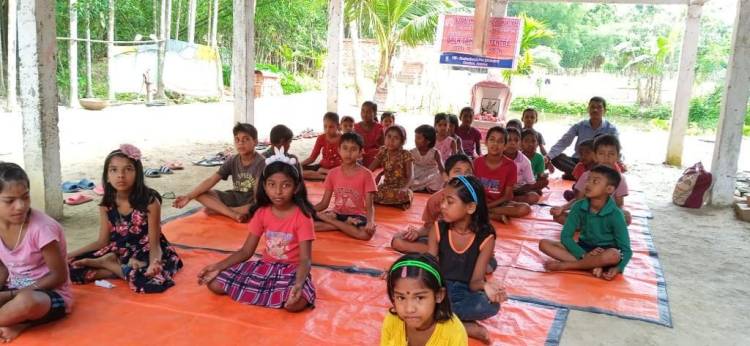[GHHF] Bala Samskar Kendras in Assam – learned about the life of Veera Savarkar, his struggle to free India from British, 50 years hard labor and his book on Hindutva
 Narendra Modi, Prime Minister
Narendra Modi, Prime Minister
“Veer Savarkar’s personality comprised firmness and magnanimity. His fearless and self-respecting nature did not appreciate the mentality of slavery at all. Not only the freedom movement, whatever Veer Savarkar did for social equality and social justice is remembered even today,”
Global Hindu Heritage Foundation is extremely happy to inform that we are conducting about 200 Bala Samskar Kendras in five States in India – Assam, Telangana, Andhra, Karnataka and Tamil Nadu. We have many active Hindus who are helping in different ways to ensure our children are taught about the richness of Sanatana Dharma. Each school is teaching different things and at the same time they follow the required syllabus to ensue all the students learn things that are common to all the students. It is challenging as the ages of the students varied from one school to another.
Who is Veer Savarakar?
Vinayak Damodar Savarkar (28 May 1883 – 26 February 1966), was an Indian politician, activist, and writer. Savarkar developed the Hindu nationalist political ideology of Hindutva while imprisoned at Ratnagiri in 1922.He was a leading figure in the Hindu Mahasabha. He started using the honorific prefix Veer ("brave") since he wrote his autobiography. Savarkar joined the Hindu Mahasabha and popularized the term Hindutva (Hinduness), previously coined by Chandranath Basu, to create a collective "Hindu" identity as an essence of Bharat (India).
Vinayak Damodar Savarkar, commonly known as Swatantryaveer Savarkar was a fearless freedom fighter, social reformer, writer, dramatist, poet, historian, political leader and philosopher. He remains largely unknown to the masses because of the vicious propaganda against him and misunderstanding around him that has been created over several decades. This website attempts to bring the life, thought, actions and relevance of Savarkar before a global audience.
◾The first political leader to daringly set Absolute Political Independence as India’s goal (1900).
◾The first Indian political leader to daringly perform a bonfire of foreign (English) clothes (1905).
◾The first Indian to organize a revolutionary movement for India’s Independence on an international level (1906).
◾The first Indian law student who was not called to the English Bar despite having passed his examination and observed the necessary formalities, for his activities to seek India’s freedom from the British (1909).
◾The only Indian leader whose arrest in London caused legal difficulties for British Courts and whose case is still referred to in the interpretations of the Fugitive Offenders Act and the Habeas Corpus (Rex Vs Governor of Brixton Prison, ex-parte Savarkar)
◾The first Indian historian whose book on the 1857 War of Independence was proscribed by British Authorities in India even before its publication. The Governor General had asked the Postmaster General to confiscate copies of the book six months before the book was officially banned (1909).
◾The first political prisoner whose daring escape and arrest on French soil became a cause celebre in the International Court of Justice at The Hague. This case was mentioned in many International Treaties at that time (1910).
◾The first graduate whose degree was withdrawn by an Indian University for striving for India’s freedom (1911).
◾The first poet in the world who, deprived of pen and paper, composed his poems and then wrote them on the prison walls with thorns and nails, memorized ten thousand lines of his poetry for years and later transmitted them to India through his fellow-prisoners who also memorized these lines.
◾The first revolutionary leader who within less than 10 years gave a death-blow to the practice of untouchability in the remote district of Ratnagiri while being interned there.
◾The first Indian leader who successfully started –◾A Ganeshotsava open to all Hindus including ex-untouchables (1930).
◾Interdining ceremonies of all Hindus including ex-untouchables (1931).
◾“Patitpavan Mandir”, open to all Hindus including ex-untouchables (22 February 1931).
◾A cafe open to all Hindus including ex-untouchables (01 May 1933).
◾The first political prisoner in the world who was sentenced to Transportation for Life twice, a sentence unparalleled in the history of the British Empire.
◾The first political leader to embrace death voluntarily by way of Atma Samarpan in the highest tradition of Yoga (1966).
Death
Throughout his life, Savarkar practiced what he preached. On 03 February 1966, he started abstaining from food. After a few days, he abstained from liquids too. He instructed his physicians not to administer him any medicines. On 24 February 1966, Savarkar folded his hands and in a feeble voice quoted the couplet of saint Tukaram, “amhi jato aamuchya gava! aamucha ram raam ghyava”(we are going to our native town, please accept our farewell ) . These were his last words! On Saturday, 26 February 1966, at around 11 a.m., in the tradition of great Hindu seers, Savarkar breathed his last in Mumbai.
DONATIONS
PayPal Method: To donate visit our website: savetemples.org. Click on the Donate button, then press the Purpose category, and select the Ghar Waapasi Donation category.
By Zelle: ghhfusaorg@gmail.com
By Check: Or you can send a check payable to GHHF, . It is tax-deductible.
RUPEES, if you would like to contribute to rupees, please either call or send an email. We will call you back to give you the required information
For more information, call Prakasarao Velagapudi at 601-918-7111; Email: ghhfusaorg@gmail.com





















 Urgent support needed for Bangladesh Hindus
Urgent support needed for Bangladesh Hindus 







